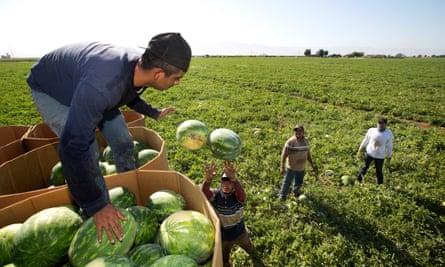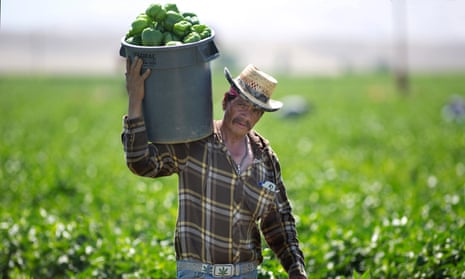In one corner of the field, children plucked berries and mashed them into their mouths. In another they tugged carrots from the soil and waggled them in the air, squealing with delight. Others trundled around the grounds in a choo-choo train decorated as a bumble bee.
There was a cow bounce, a chicken show, an animal petting corral, a hay pyramid, a combine harvester slide, picnic tables and, depending on parental budgets, a choice of standard birthday party, deluxe birthday party and pony paddock birthday party.
No doubt about it: farming was fun. The nearest thing to Grapes of Wrath was a produce stand with fruit juice.
This was agriculture according to Underwood Family Farms, a bucolic patch of Ventura County, California, which entices families from Oxnard, Los Angeles and other nearby cities to pick their own fruit and veg and get a taste of rural life.
“The kids love it. We probably come five or six times a year,” said Michelle Engelbach, 36, pulling a wooden cart containing three young children and containers of berries. “They mow down the strawberries. It’s instant gratification.”

Around each of the scores of such “U-pick” farms in California – offering recreation, entertainment and do-it-yourself harvesting – are other farms. The big, working farms which produce much of America’s fruit and vegetables.
The juxtaposition can be startling.
Instead of mostly white children gambolling in shorts and flip-flops there are latino men and women bent over double, wearing jeans, boots and masks. They labour in silence under the gaze of supervisors, snipping, plucking, hacking, hauling and packing for up to 13 hours a day.
“You have to be fast. If you’re not, they scold you. ‘Move it, hurry up,’” said Veronica Villano, 28, a veteran Ventura County raspberry picker. “You drink water when you can but they don’t always let you.”
You drink water when you can, if you pick raspberries for a living, because you work in plastic tunnels which act like an oven, sending temperatures to 100F (37C). Great for raspberries, less so for humans.
Then there is the dust, the bee stings, the flash floods which turn the earth swampy and the pesticides and chemicals – 39 by one count – such as nitrogen fertiliser which gives her headaches. “You can smell it. I get dizzy and vomit sometimes,” said Villano.
And then there’s the pay: $10 an hour. Not enough to cover the rent on her family’s studio apartment in Oxnard let alone contribute to a nest egg for the baby that Villano, eight-months pregnant, is expecting.

Yet the Mexican immigrant still prefers raspberries to the alternatives: unemployment and penury, or the risks from strawberries.
Strawberries are even more contaminated than raspberries – they just topped the Environmental Working Group’s annual “dirty dozen” list, a shopper’s guide to pesticides in produce. Some 98% of the samples tested by federal officials had pesticide residues. Apples came second, followed by nectarines, peaches, celery, grapes, cherries, spinach and tomatoes.
Perhaps even worse, from Villano’s perspective, is that strawberries are lower to the ground, requiring perpetual squatting and crouching, a posture known as the stress position when forced on prisoners. “I can’t stand it,” she said.
Her husband, Oscar Hernandez, 35, said first-timers become so stiff they cannot sit, not even on the toilet. He endures strawberries because he cannot stand raspberries. “I did it for one day. It was eternal. The heat, my God.”
Hernandez has never been to a U-pick and he suspects most U-pickers have never been to a working farm. “They should come and see what it’s like, see how long they last. Some places don’t care about your conditions or your life. They care about the fruit.”

Jorge Toledano, 30, another strawberry picker, who belongs to the Mixteco Indigena Community Organizing Project, said consumers tended not to see beyond the brightly coloured, little plastic boxes which are packed directly in the field and shipped to supermarkets. “They don’t ask how it got to their table.”
Labourers also complain about unpaid wages, extortion in the form of having to serve three days unpaid “apprenticeship” to land a job and lack of protective equipment such as gloves, goggles and masks.
Many accept such conditions because they feel vulnerable for want of documents, English and sometimes, in the case of indigenous colleagues, even Spanish, said Hernandez.
Unlike his wife, however, he is now part of a powerful union – the United Farm Workers of America (UFW) – and said he now enjoys better hours and conditions to the point of being “contento”, happy. “In a union, you’re protected.”
His five-year-old daughter, Brenda, has acquired a taste for activism by attending UFW marches and hopes to shake up agriculture when she grows up. “She says she wants to be president,” Hernandez said.
Phil McGrath, 64, a fourth-generation farmer who runs a 300-acre organic farm outside Oxnard, said the chasm between U-pick idylls and agribusiness reality will not close anytime soon. “Those places give a fantasy land, a Disneyland view of agriculture. It’s all wonderful. I don’t think the (visitors) realise it’s off the back of cheap labour and chemicals.”
US consumers demanded cheap food, and agribusiness corporations obliged by underpaying workers, over-spraying crops and supporting trade deals to import food from countries with even worse conditions, McGrath said. “People don’t want to pay more than $1 for a head of lettuce. So we’re paying poverty wages. It’s a broken system.”

Even so, McGrath said laws, regulations and demand for organic produce had improved workers’ conditions and crops’ integrity over the decades. “My dad loved DDT.”
Some of the U-pickers at Underwood Family Farms needed no tuition in the reality beyond their genteel oasis. “The kids may think it’s fun – they’re too young to get a sense of the back-breaking labour involved,” said Margie Chavez, 63, who was visiting with grandchildren. “But my dad was a farmer and I know the effort it takes to get those beautiful fruits and vegetables in the store.”

Comments (…)
Sign in or create your Guardian account to join the discussion